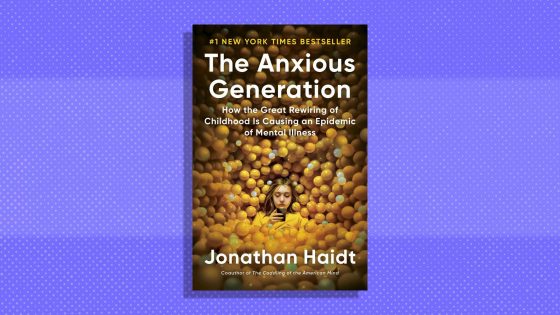Nearly two decades into the smartphone era, some experts are warning of the potential dangers of being plugged in anytime, anywhere. Especially when it comes to those whose brains are still developing.
Americans under the age of 30 reported lower levels of happiness from 2021 to 2023 than those over the age of 60, according to this year’s World Happiness Report.
Jonathan Haidt, a social psychologist at New York University’s Stern School of Business lays the blame squarely on our devices.
His new book, “The Anxious Generation: How the Great Rewiring of Childhood is Causing an Epidemic of Mental Illness” he argues that the constant access to social media that phones have given us has led to social comparison, sleep deprivation and loneliness in Gen Z.
And it’s touched a nerve: his book is currently No. 3 on the New York Times nonfiction bestseller list.
Zach Rausch, lead researcher to Haidt and an associate research scientist at NYU-Stern School of Business, says kids who had access to social media and iPhones in elementary and middle school are more anxious and less productive.
“The goal of technology is that it’s a tool that we use to meet our goals,” he says. “If it’s not doing that, it ends up using us at the cost of our goals.”
But, there are ways to curb these negative effects. Here are three things you can do today to increase your happiness and stay focused.
1. Buy an alarm clock.
Your phone being the last thing you interact with before bed and the first when you wake up can adversely affect your sleep and add to stress levels.
Purchasing an alarm clock and keeping your device outside your bedroom can create some physical and mental distance from social media.
2. Use your phone to meet with people in person.
Oftentimes, conversations on Instagram or text don’t cross over from digital to physical.
“We used flip phones to connect with each other in order to eventually meet in person,” Rausch says. “The online world is kind of the opposite. We connect in order to stay there. And our argument is that that’s not sufficient.”
We used flip phones to connect with each other in order to eventually to meet in person. The online world is kind of the opposite. We connect in order to stay there
Zach Rausch
associate research scientist at NYU-Stern School of Business
Yale University happiness professor Laurie Santos echoes this sentiment.
3. Silence notifications.
Adolescents get 237 smartphone notifications a day, according to a 2023 study which surveyed 203 teens and tween between ages 11 and 17. Almost a quarter, 23%, arrived during school.
Silencing your notifications can help you stay present and productive during the hours it matters most.
Rausch emphasizes that getting rid of smartphones is not a panacea for depression. But, using your phone in a more thoughtful way can help you pursue activities that are proven to increase your happiness, like in-person social connection, and get more done.
“It’s not that we need to reject technology outright,” he says. “It’s that as technology is rapidly changing the way that we live our lives we need to press pause and think about how we want this to be in our lives. Is it fulfilling us? Is it helping us flourish? Is it helping us meet our goals? And, if not, what can we do to change it?”
Want to be a successful, confident communicator? Take CNBC’s new online course Become an Effective Communicator: Master Public Speaking. We’ll teach you how to speak clearly and confidently, calm your nerves, what to say and not say, and body language techniques to make a great first impression. Sign up today and use code EARLYBIRD for an introductory discount of 30% off through July 10, 2024.
Plus, sign up for CNBC Make It’s newsletter to get tips and tricks for success at work, with money and in life.
Source Agencies



